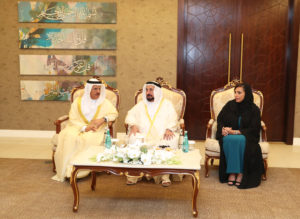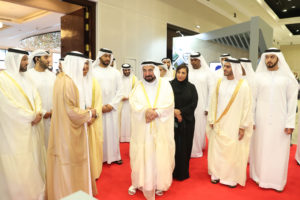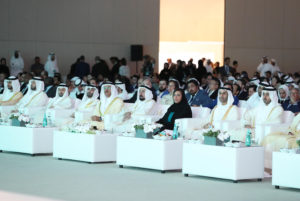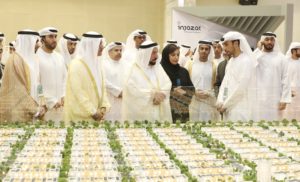Sheikh Sultan Al Qasimi Opens Sharjah FDI Forum 2019
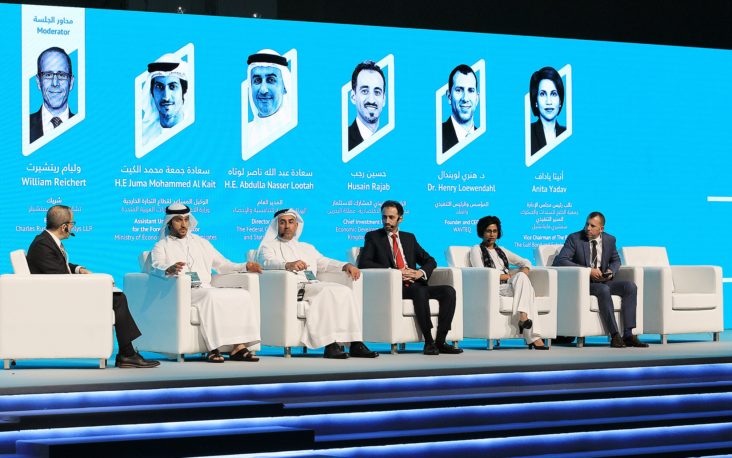
The fifth edition of the region’s leading FDI event, the Sharjah FDI Forum, titled ‘Future Trends in Foreign Direct Investment’, got underway at Sharjah’s Al Jawaher Reception and Convention Centre (JRCC), inaugurated by HH Sheikh Dr. Sultan bin Muhammad Al Qasimi, Supreme Council Member and Ruler of Sharjah. The Forum is organised by the Sharjah FDI Office (Invest in Sharjah), an affiliate of the Sharjah Investment and Development Authority (Shurooq).
The forum started on Monday (November 11), with optimistic comments by the UAE Minister of Economy and the Sharjah Investment and Development Authority (Shurooq) Executive Chairman about the UAE’s consistent economic performance despite the global slowdown, owing to forward-looking policies focused on the creation of a digital economy based on sustainable growth principles.
The forum opened with a keynote speech by HE Eng. Sultan bin Saeed Al Mansouri, UAE Minister of Economy, saying that despite the 13.4 percent slide in FDI inflows globally in 2018 compared to the last three years as per an UNCTAD Global Investment Report, the UAE has held fort due to forward-looking national economic policies, and mentioned the important role of the Sharjah FDI Forum in having a positive impact on Sharjah’s and the UAE’s foreign investment climate.
“Capital flow increased only by a small percentage in developed economies, and even though the UAE not isolated form these global trends but we have managed to control impact. The economy attracted over USD 13 last year, and the UAE ranks second in Asia and 27 in the world in terms of FDI competitiveness”.
Sharing more about the UAE’s economic performance in 2018, the Al Mansouri added that the Asian continent was the top foreign direct investor in the UAE, followed by Europe, North America and Africa. He added that the UAE ranked second globally for entering into international bilateral investment agreements, and was the third in the world to announce new FDI projects announcements.
Going back to the theme of the forum, the minister highlighted that advancing the UAE’s digital economy was among the top KPIs for UAE Vision 2021 as well as 2071. “The 2018 FDI law offered us a big jump in FDI inflows. We attracted more than 122 foreign direct investments in a variety of sectors including agriculture, renewable energy, and others. Also, federal initiatives like the new permanent residency law and the introduction of the golden card have really boosted investor confidence in the UAE”.
“We have a clear roadmap about the UAE’s digital revolution. Be it education, healthcare, transportation or other sectors, 4IR, robotics, smart cities, blockchain are all “technologies are all integrated in our future economic strategies.”
Al Mansouri concluded saying: “Our vision for the future is clear, and we are guiding the nation towards becoming responsive to the needs of foreign investors. The atmosphere of investments in the UAE is shaping in the right way and is pioneering regionally. In the digital economy sector too, our plans are solid, and this forum is an example of our guided efforts.”
HE Marwan bin Jassim Al Sarkal, Executive Chairman, Sharjah Investment and Development Authority (Shurooq), said that in view of rapid digital disruptions in economy and society, the future will belong to those who prepare for it today.
He noted: “In the past 20 years, we have seen transportation, retail, construction and services sectors being completely overhauled by technology. The changes continue, and at a faster rate than ever, there needs to be speed and flexibility in legislation, regulations and infrastructure to capitalise on them.”
“Artificial Intelligence reviews a legal contract in 26 seconds, with an accuracy rate of 94 percent, while humans do it in 92 minutes with an accuracy rate that doesn’t exceed 85 percent. AI augmentation will generate business worth USD 2.9 trillion and 6.2 billion hours of worker productivity globally, according to Gartner”, Al Sarkal added.
Bringing the focus to local developments, he said: “In the UAE, we have an AI Council, and a UAE Fourth Industrial Revolution (4IR) Ambassador, a Minister of State for AI. We also have centres for innovation and advanced training, and the journey continues. Here in Sharjah, we are testing the construction a tower using 3D printing technologies, testing self-driving cars, and building a hanging railway system, set to revolutionise the region’s transportation sector.”
“Governments need to be flexible”, he added Al Sarkal, emphasising that future FDI trends are moving extremely fast. “The speed, ease and flexibility of technology need to be harnessed to empower businesses, boost FDI and achieve sustainable growth”.
He concluded saying, “Also, we need to further stimulate our FDI environment for a stronger uptake of investments in innovation and educate, train and attract talent who will lead us into the future.”
HE Mohammed Juma Al Musharrkh, CEO of Sharjah FDI Office (Invest In Sharjah) was on stage next, and began by thanking His Highness Sheikh Dr. Sultan bin Muhammad Al Qasimi for his continued support to and trust in Sharjah institutions taking the emirate’s economy forward.
“There is no one solution that fits all business needs. But here in Sharjah, our efforts to diversify our economy and achieve balanced, sustainable growth by enabling mutually beneficial relationships between the government and investors, in which their business interests are aligned to our cultural values and development goals – are paramount”.
These efforts he said have continued to boost investor confidence regionally and globally, which prompted Invest In Sharjah to launch the “Sharjah Investors Services Center – SAEED” – a one-window services for investors. With SAEED, we are bringing all government services under one roof for investors to enjoy a record turnaround time – from initiation to establishment of their business.”
Mo Gawdat, former Chief Business Officer of Google X, who has engineered a happiness equation based on technology in his best-selling book Solve for Happy, opined that nations and economies need to be more in tune with the emerging uses of technology, saying that every technology we can dream of is “already available and buildable on a science fiction scale.”
“At Google X, our mandate was we were going to solve six problems a week that would impact the lives of a billion people. And we did it. Every solution was without exception tech based”, he continued, highlighting that most humans are naturally designed to uptake incremental innovation rather than radical innovation. “Why are some economies benefitting more than others? It is because they look into radical tech-based solutions. Take the human versus self-driving car as an example.”
“I see the UAE is investing in these technologies incrementally and I urge other nations and businesses to do the same. The game here is how many of us will capture these waves when they start breaking out. The business mindsets need to change in a big way. We need to go with radical innovation at the core,” Gawdat concluded.
The opening ceremony concluded with the Sharjah Ruler honouring sponsors and partners of the Sharjah FDI Forum 2019.
Applying Industry 4.0 to FDI for Sustainable Development
The opening ceremony was followed by the first panel discussion of the forum, which brought together, HE Juma Mohammed Al Kait, Assistant Undersecretary, UAE Ministry of Economy – Foreign Trade Affairs; HE Abdulla Nasser Lootah, Director General, The Federal Competitiveness and Statistics Authority; Husain Rajab, Co-Chief Investment Officer, Bahrain Economic Development Board; Dr. Henry Loewendahl, Founder and CEO, WAVTEQ; and Anita Yadav, Vice Chairman Of The Board, The Gulf Bond & Sukuk Association, & CEO of Century Financial, to deliberate on the all-important question – how will sustainable development will be achieved using Industry 4.0?
Al Kait opined that this could only happen if, “we link our economic policies with social development. The UAE is well aware of this requirement and is steering policies and investments to promote more sustainable initiatives. The element of sustainability is always there when we shape our policies, launch initiatives and start new projects that promote the creation of a circular economy. The Sharjah Sustainable City is an example of this vision; this element about how FDI can impact sustainable development.”
Rajab said that historically the manufacturing sector has heavily influenced every other sector because it has the highest multiplier effect in any economy. “Industry 4.0 is about taking manufacturing to the next level through data science and data analytics. The unique advantage of Industry 4.0 is that it is applicable to every other sector to achieve productivity improvement and efficiency gains, and ultimately achieve sustainability. This is why it is very important for Industry 4.0 to be understood not only by industrialists by all other economic sectors.”
What role do competitiveness reports play a role in boosting FDI, was taken up by Lootah. Offering an overview of the four industrial revolutions, he commented, “Competitiveness today is going to be driven by economies that handle such transformations faster and take the lead. We need to understand that talent is our main resource. In order to attract FDI and talent you also need something very important. A system of laws and regulations – not for today but for 50 years ahead of today. In a nutshell, we cannot work in isolation. Collaborative and integrated efforts will be key to addressing the human needs and the expectations of the future.”
Next up, Loewendahl quoted form a PwC report, saying 80 percent companies now want to do business with those who have signed up to the UNSDG 2030 goals. “Sustainable food R&D, green technologies, water based sustainable agriculture are sectors worth tens of billions of dollars, and open up massive opportunities for attracting sustainable FDI. Industry 4.0 has a huge role to play in preparing local economies for bringing in such investments.”
He added: “Which economies are really fully equipped to do so? Very few. And they are going to enjoy first movers advantage.”
Finally, Anita reminded the importance of regulations in taming the uncontrolled growth of technology, saying “it can be disastrous to economy and society. Laws need to be put in place to streamline and set the pace of these developments in a way that is beneficial to the economy and to society in the long term.”
The two-day forum brings together more than 54 speakers, including top economists and leaders in business and finance, as well as local and regional senior government officials who are addressing 1,500 participants at 12 discussion sessions at eight panels and four special sessions, as well as five workshops and a special roundtable by the Dubai Financial Market (DFM).
This edition highlights FDI trends at regional and international levels, and will shine light on vital sectors in need of more investments, such as renewable energy, healthcare, and technology. The forum will also discuss the potential impact of the 4th Industrial Revolution on the growth rate of world economies, sustainability and social stability.


